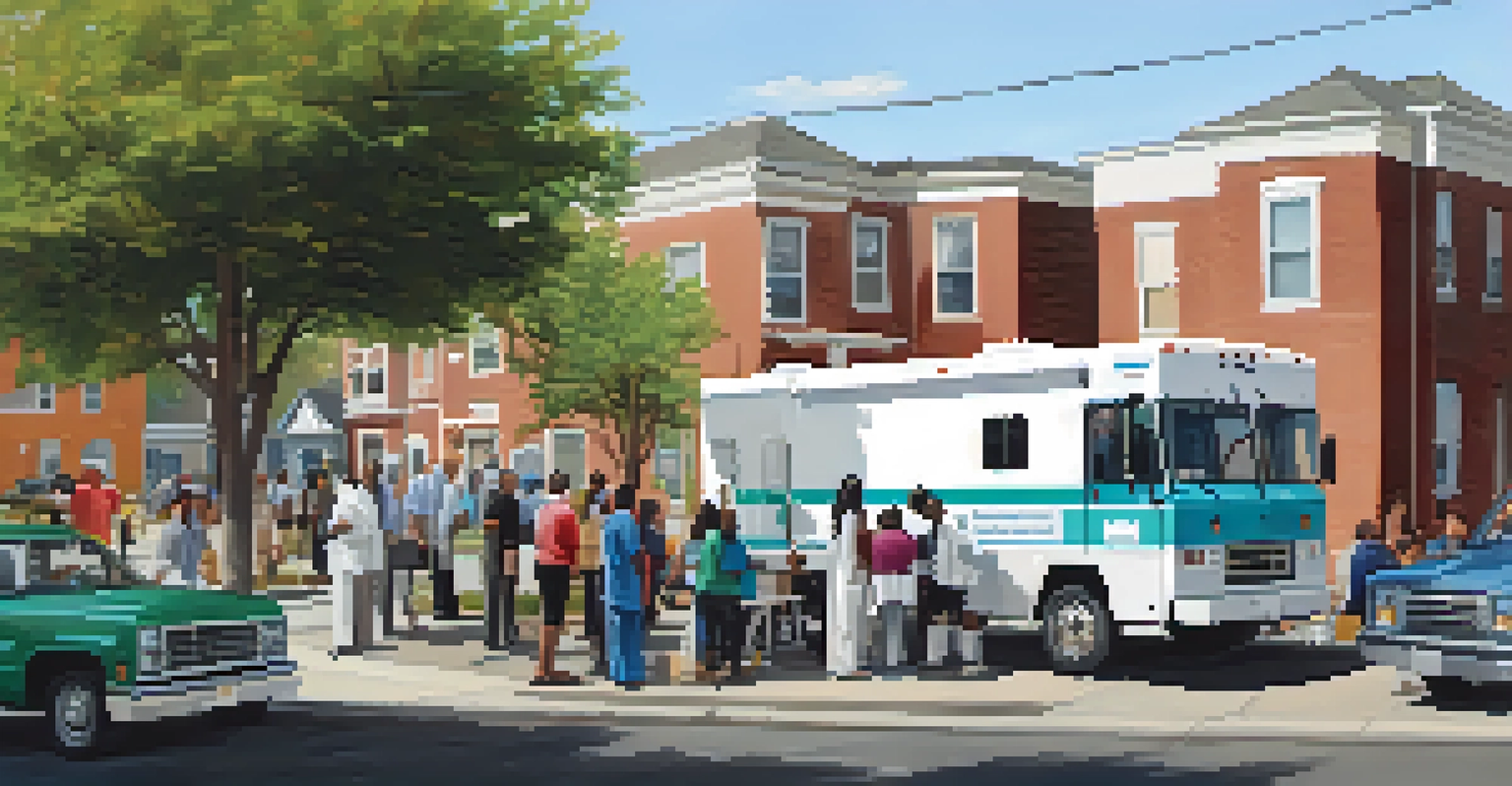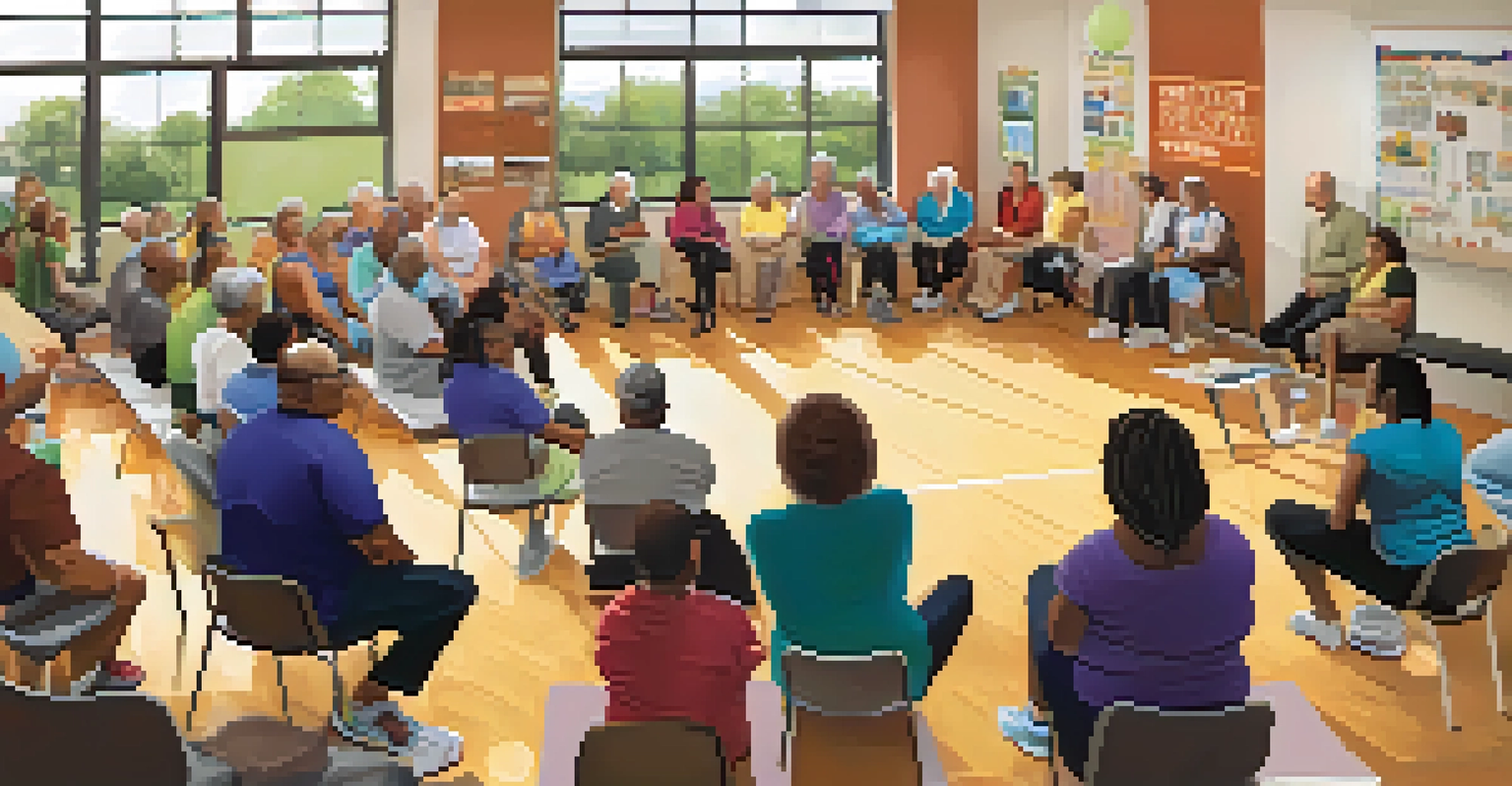Newark's Health Initiatives: Supporting Vulnerable Populations

Understanding Newark's Vulnerable Populations
Newark is home to a diverse community, but many residents face significant health disparities. Vulnerable populations, including low-income families, the elderly, and individuals with chronic illnesses, often struggle to access essential health services. Understanding their unique challenges is the first step toward creating effective health initiatives.
Health is a human right, not a privilege.
For example, lack of transportation can prevent individuals from attending medical appointments, while language barriers may hinder communication with healthcare providers. These factors can lead to delayed diagnoses and poor health outcomes. Recognizing these obstacles is crucial for developing targeted interventions that truly meet the needs of these communities.
Moreover, socioeconomic factors play a significant role in health disparities. Many residents live in food deserts, where access to nutritious food is limited, further exacerbating health issues. By addressing these interconnected challenges, Newark aims to build a healthier environment for all its residents.
Key Health Initiatives in Newark
Newark has implemented several health initiatives aimed at supporting its vulnerable populations. One notable program is the Newark Community Health Centers, which provide comprehensive primary care services to underserved communities. These centers not only offer medical care but also focus on preventive services, education, and outreach.

Additionally, the city has launched mobile health clinics that travel to neighborhoods in need. These clinics provide essential services like vaccinations, screenings, and health education directly to those who may otherwise have difficulty accessing healthcare. This proactive approach ensures that healthcare is not just a privilege for some, but a right for all.
Addressing Health Disparities
Newark's initiatives target vulnerable populations by overcoming barriers like transportation and language to improve health access.
Partnerships with local organizations and nonprofits further enhance these initiatives. By collaborating with community leaders, Newark can tailor its health programs to the specific needs of its residents, fostering a sense of ownership and engagement among the community.
Addressing Mental Health Needs
Mental health is a critical component of overall well-being, yet it often goes overlooked, especially in vulnerable communities. Newark's health initiatives have made significant strides in integrating mental health services with primary care. This holistic approach ensures that individuals receive comprehensive support for both physical and mental health challenges.
The greatest weapon against stress is our ability to choose one thought over another.
For instance, programs that include mental health screenings as part of routine medical visits help identify issues early on. By normalizing mental health discussions, these initiatives reduce stigma and encourage individuals to seek help. This shift in perception is essential in creating a supportive environment for those struggling with mental health issues.
Furthermore, Newark has invested in community-based mental health resources, including peer support groups and counseling services. By providing accessible and relatable support, these programs empower individuals to take charge of their mental health and foster resilience within the community.
Promoting Health Education and Awareness
Health education is vital in empowering vulnerable populations to make informed decisions about their well-being. Newark's health initiatives emphasize the importance of community education programs that teach residents about nutrition, exercise, and preventive healthcare. These programs aim to equip individuals with the knowledge they need to lead healthier lives.
Workshops and seminars are often held in community centers, schools, and churches, making information readily available to those who need it most. By engaging residents in interactive learning experiences, these initiatives foster a sense of community and encourage collective action toward better health.
Integrating Mental Health Services
Newark emphasizes a holistic approach by integrating mental health support into primary care to enhance overall well-being.
Moreover, social media campaigns and local outreach efforts help disseminate critical health information quickly and effectively. In today's digital age, utilizing technology enhances the reach of health education, ensuring that vital messages resonate with diverse audiences across Newark.
Building Partnerships for Health Equity
Achieving health equity requires collaboration among various stakeholders, including government agencies, healthcare providers, and community organizations. Newark's approach to health initiatives involves creating strategic partnerships that leverage resources and expertise. This collective effort enhances the city's ability to address the complex needs of its vulnerable populations.
For example, partnerships with local universities have led to research-driven solutions tailored to specific community health challenges. By incorporating academic insights into practical applications, Newark can implement evidence-based strategies that yield positive results. These collaborations not only benefit the community but also enrich the educational experiences of students involved.
Additionally, engaging residents in the planning and implementation of health initiatives fosters trust and ensures that programs are culturally relevant. By prioritizing community voices, Newark can create a more inclusive health landscape that truly reflects the needs and aspirations of its residents.
The Role of Technology in Health Initiatives
Technology plays a transformative role in Newark's health initiatives, enhancing accessibility and efficiency. Telehealth services have surged in popularity, allowing residents to connect with healthcare providers from the comfort of their homes. This is particularly beneficial for vulnerable populations who may face barriers to in-person visits.
Moreover, health apps and online resources empower individuals to take charge of their health by providing information and tools for self-management. For instance, apps that remind users to take medications or track their appointments help foster accountability and adherence to treatment plans. This integration of technology supports a more proactive approach to healthcare.
Leveraging Technology for Access
The city utilizes telehealth and health apps to improve healthcare accessibility and empower residents in managing their health.
As Newark continues to explore innovative solutions, the city is also working on improving its digital infrastructure. Ensuring that all residents have access to reliable internet and technology is essential in bridging the gap in healthcare access, particularly for those in underserved areas.
Evaluating the Impact of Health Initiatives
Evaluating the effectiveness of health initiatives is crucial for understanding their impact on vulnerable populations. Newark employs various metrics to assess the success of its programs, including health outcomes, patient satisfaction, and community engagement. These evaluations help identify what works and what needs improvement.
Feedback from residents plays a vital role in this evaluation process. By soliciting input and suggestions, Newark can adapt its initiatives to better meet the needs of the community. This continuous loop of feedback and adjustment ensures that health programs remain relevant and effective over time.

Additionally, sharing success stories and case studies fosters a sense of hope and motivation within the community. When residents see tangible results from health initiatives, it encourages them to participate actively and support one another in their health journeys.